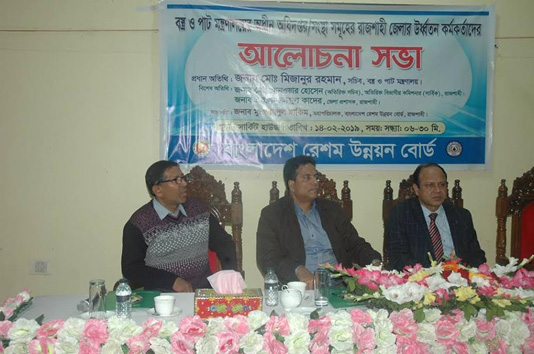RAJSHAHI, Feb 15, 2019 (BSS)- Speakers at a discussion here mentioned
boosting production of local yarn can help revitalising the silk sector to
regain its lost legacy alongside meeting up the existing local demands.
Local consumption could be met up through domestic outputs after the
best uses of the existing natural resources and there is no doubt in this
regard.
They came up with the observation while addressing a view-sharing
meeting with executives and officials of Bangladesh Silk Development Board
(BSDB) at Circuit House on Thursday evening.
Secretary to Textile and Jute Ministry Mijanur Rahman and Additional
Commissioner of Rajshahi Division Anwar Hossain addressed the meeting as the
chief and special guests respectively with BSDB Director General Abdul Hakim
in the chair.
BSDB Members Syeda Zebinnissa Sultana, Nasima Khatun and Abdul Mannan
and Director of Bangladesh Sericulture Research and Training Institute Monsur
Ali also spoke on the occasion.
Chief Guest Mijanur Rahman says Bangladesh’s silk industry is one of the
oldest in the world, with farmers in the region producing some of the most
sought-after silk yarns.
He said importance should be given on providing necessary support and
inputs like disinfectant eggs, high yielding mulberry plants, technical
support and soft loan for construction of rearing house along with ensuring
sound marketing facilities to the rearers.
Mr Rahman said sericulture, a labor- intensive agro- based industry, is
ideally suited to the socio-economic condition of the country and the sector
cover both agriculture and industry.
Referring to various positive aspects of the sector he also said
promotion and expansion of sericulture throughout the country could
contribute a lot to eradicate the acute poverty of the hardcore people of the
rural Bangladesh.
As a cottage industry, all family members can work and earn
supplementary income in sericulture and it facilitate four to five crops in a
year and ensure more income requiring less investment and training.
Abdul Hakim told the meeting that BSDB has taken initiative to revive
the silk industry.
Accordingly, several projects have already been adopted. A project has
been taken to identify char and khas lands for silk farming. In the last
fiscal year, the board distributed four lakh mulberry saplings.
Sericulture has been incorporated in the ‘Ekti Bari, Ekti Khamar (EBEK)’
project for strengthening the agro-based economy through reviving the lost
glory of sericulture.
Under the joint venture, around 2.75 lakh mulberry plants were
distributed among 1,680 EBEK members. Some 777 of them were given need-based
training on how to plant and nurse the plants properly.
He said two state-owned silk factories can be restarted in phases
through boosting the production of raw silk locally. Through this, about
10,000 people of the region will get employment opportunities.
On the occasion, they also visited the BSDB headquarters, silk factory
and BSRTI here today.



